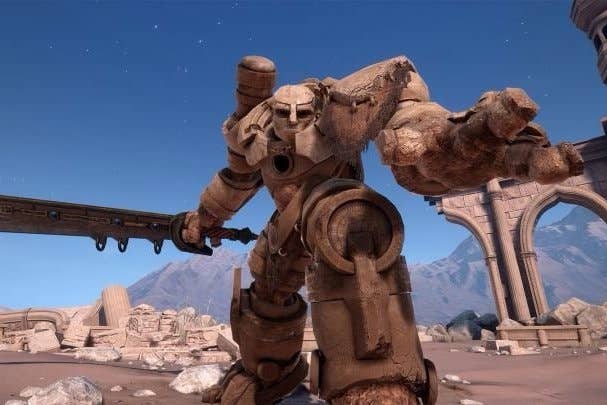Ex-Halo devs find fault with big studio practices
Highwire Games' Jaime Griesemer and Marty O' Donnell critical of planned layoffs, "auteurs" on large teams
With resumes that include decade-plus stints at Bungie each, designer Jaime Griesemer and composer Marty O' Donnell have plenty of experience working in AAA game development. But speaking with Playboy recently, the developers said there were some aspects of working on large teams they were happy to leave behind when they went indie to form Highwire Games.
"It's really easy to get into a situation we call feeding the beast, where there's this enormous production team that isn't allowed or isn't capable of making progress on their own, so creative directors are always just trying to generate something for those guys to do," Griesemer said. "And you come in every day and you're like, 'OK, there's a line of like seven people waiting for me to tell them what to do, I guess I will just--as fast as I can--make something up.' And that's crisis mode... I don't want to ever put myself in the position where I'm just kind of making it up as I go along, because otherwise we're paying people to sit around and twiddle their thumbs--or worse, talk shit about the direction of the game and the team."
Right now Highwire actually has its development planned out further than the team has been able to keep up with, so the studio is actually looking to increase headcount a little. However, they're intent on keeping the core of full-time developers at Highwire small, with reinforcements coming from freelancers and contractors as needed.
"I think it's going to turn out to be similar to the movie business, where you have the stakeholders of the film, the director, the producer and a few core people, writers and whatever," O' Donnell said. "And then they hire in to finish pre-production, bring in all sorts of experts for production and then they go way down [in staff] again and go into the editing room in post-production. And they put it in the theater."
Griesemer added, "And to be honest, that's kind of how the industry works already. [Companies] just are not up front about it, so they get to the end of the project and lay off half the team. And it's always the sort of mainline art production staff that they lay off, because they just don't want those guys sitting around for the next nine months or year while they figure out what game they're making next."
Studios might plan to simultaneously run post-production on one game and pre-production on the next, O'Donnell said, but it doesn't really happen in practice "because as you're screaming to the deadline of post-production on a game you keep sucking all these people in that should be on the next project already. Then at the end, it's like, 'Oh, now we need to fire you because we have nothing for you to do. We never spent the time figuring it out nine months ago.'"
It's a common enough failing that Griesemer suggested studios are actually counting on it happening.
"They plan--the layoff is part of the budget," Griesemer said, "I mean, it happens before the game even is out the door. So they know it's coming, they just don't tell their employees until the game is in the box. And to me, that's kind of treating people like cogs, like a resource. It's not respecting them as professionals. If you bring somebody in and say, 'Look, we're not going to be able to pay you after the project ships, so you should be reaching out [to find future projects], but please do stay and help us ship the game,' 95 percent of the industry would do the right thing and stay until the game is shipped. And then they'd already have something lined up."
Both Griesemer and O' Donnell stressed the importance of having someone with a vision at the helm of a production making decisions to keep development on track and ensuring everything worked together, but they weren't ready to embrace the "auteur" model of game development.
"I'll be honest," Griesemer said. "I think the auteur version of game development works really well if you're making a game by yourself. And actually a lot of those guys got started that way. You know, the first Metal Gear was-I think the team was like 10 people. I think once you get to bigger teams, 'auteur' almost always means 'I'm not disciplined enough to plan ahead,' so I just have to react to everything and tell you I don't like it. And a lot of those games end up going way over-budget and way under-delivering or just being a kind of a disorganized mess..."









